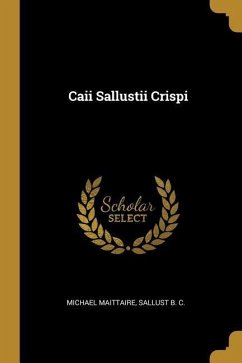C. Sallustii Crispi Opera Omnia est volumen quod continet omnes scripta C. Sallustii Crispi, historici Romani saeculi primi a.C.n. Inter haec scripta sunt Bellum Catilinae, Bellum Iugurthinum, fragmenta de historia Romae, et orationes. In his scriptis, Sallustius vitam et mores Romanorum describit, et multa de virtutibus et vitiis eorum narrat. Volumen hoc editum est anno MDCCCXLIX.This scarce antiquarian book is a facsimile reprint of the old original and may contain some imperfections such as library marks and notations. Because we believe this work is culturally important, we have made it available as part of our commitment for protecting, preserving, and promoting the world's literature in affordable, high quality, modern editions, that are true to their original work.
Hinweis: Dieser Artikel kann nur an eine deutsche Lieferadresse ausgeliefert werden.
Hinweis: Dieser Artikel kann nur an eine deutsche Lieferadresse ausgeliefert werden.








